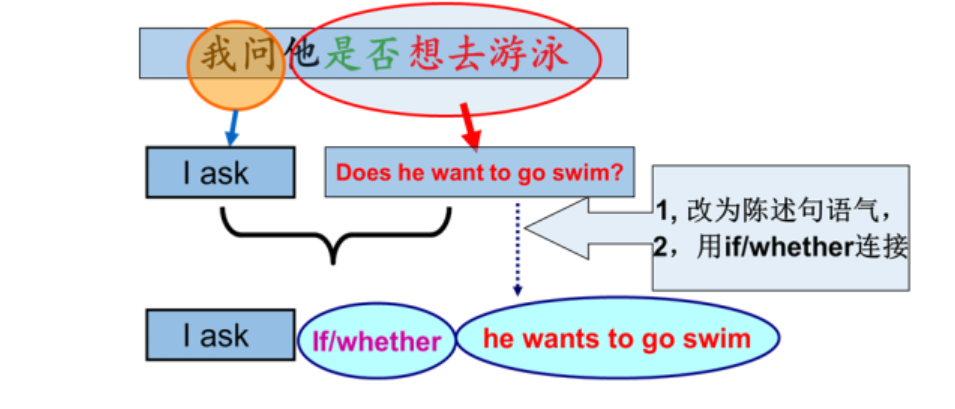認(rèn)識賓語和賓語從句
賓語:
放在實(shí)意動詞之后的詞,即為賓語�。賓語可以由名詞��、代詞�、不定式或相當(dāng)于名詞的詞�、短語來擔(dān)任。
I like my teacher.(名詞作賓語)
I enjoy playing basketball.(動名詞作賓語)
I decide to study hard.(不定式作賓語)
I know him.(代詞作賓語)
賓語從句:
置于動詞��、介詞等詞性后面起賓語作用的從句叫賓語從句���。即在復(fù)合句中�,由一個句子充當(dāng)賓語����,這個句子就叫做賓語從句。謂語動詞��、介詞、動詞不定式����、v.-ing形式、部分形容詞(如afraid, sure, glad等)后面都能帶賓語從句��。
賓語從句的基本結(jié)構(gòu)及“三要素”

賓語從句就是由一個句子來構(gòu)成主句的賓語����,并有一個連接詞引導(dǎo)����。
賓語從句的“三要素”為:連接詞、語序和時態(tài)�����。
1����、賓語從句中引導(dǎo)詞(連接詞)
通常有:
連接代詞:that, whether, if, who, whose, what, which等;
連接副詞:when, where, how, why等。
2��、賓語從句的語序為陳述語序���。
無論主句是陳述句還是疑問句����,賓語從句都必須使用陳述語序,即“主句+連詞+賓語從句(主語+謂語+……)”句式����。
3、賓語從句的時態(tài)應(yīng)與主句時態(tài)保持一致����。
1)當(dāng)主句是一般現(xiàn)在時,從句任何時態(tài)都可以���。根據(jù)想表達(dá)的使用�����。
The headmaster hopes everything goes well.
2)當(dāng)主句是一般過去式���,從句用相應(yīng)的過去式。
She was sorry that she hadn't finished her work>3)當(dāng)主句是過去時�����,從句表述客觀事實(shí)時,從句時態(tài)用一般現(xiàn)在時����。
The teacher told his class that light travels faster than sound.
賓語從句的具體用法
(一)that引導(dǎo)的賓語從句
1、當(dāng)賓語從句是陳述句時(包括肯定句和否定句)�����,連詞由that引導(dǎo)��,因為that在從句中不作任何成分����,也沒有任何具體意思����,因此在口語或非正式文體中常省略。
She says (that) she won't take part in the sports meeting.
He told me (that) he wouldgo to the college the next year.
2��、主句為動詞be加某些形容詞(如sorry, sure, afraid, glad等)作表語時��,后面所跟的省略that的從句也是賓語從句��。
I'm sorry (that) I don’t know.
We're sure (that) our team will win.
I’m afraid (that) he won't pass the exam.
3���、賓語從句的否定轉(zhuǎn)移
當(dāng)主句謂語動詞是think, believe, suppose, expect等詞�,而賓語從句的意思是否定時,常把否定轉(zhuǎn)移至主句表示�����。
I don't think it is right for him to treat you like that.
我認(rèn)為他這樣的對待你是不對的�。
4、主句的謂語動詞是think, believe, imagine, suppose, consider, expect, fancy, guess等�����,并且主句的主語是第一人稱���,而且為一般現(xiàn)在時����,從句的否定詞一般要轉(zhuǎn)移到主句上來�����,其反義疑問句一般與賓語從句一致�。
I don'tbelieve that man is killed by Jim,is he?
我認(rèn)為那個人不是Jim所殺的,是不是?
I expect our English teacher will be back this weekend, won't she/he?
我期待我們的英語老師這個周末能回來����,會嗎?
We suppose you have finished the project, haven't you?
我們猜測你已經(jīng)完成了這個項目���,是嗎?
5、如果賓語從句中有某個含有否定意義的形容詞或副詞(不包含帶有否定前綴的詞�����,如:unhappy�,unfair,dislike等),其反義疑問句要用肯定形式�。
We find that he never listens to the teacher carefully, does he?
我們發(fā)現(xiàn)他從不仔細(xì)聽老師講課,是不是?
6���、當(dāng)主句的主語是第二、三人稱時�����,其反義疑問句一般與主句保持一致��。
Your sister supposes she needs no help, doesn't she?
You thought they could have completed the project, didn't you?
They don't believe she's an engineer, do they?
She doesn't expect that we are coming so soon, does she?
7���、that不可以省略的情況:
1)當(dāng)句中的動詞后接多于兩個由that引導(dǎo)的賓語從句時�,第一個that可省,但后面的that不可省�����。
I believe (that) you have done your best and that things will get better.
2)當(dāng)主句的謂語動詞與that賓語從句之間有插入語時��,that一般不可省��。
Just then I noticed, for the first time, that our master was wearing his fine green coat and his black silk cap.
3)當(dāng)that從句是雙賓語中的直接賓語時���,that不可省�����。
I can’t tell him that his mother died.
4)當(dāng)it作形式賓語時���。
She made it clear that she had nothing to do with him.
許多帶復(fù)合賓語的句子,that引導(dǎo)的賓語從句經(jīng)常移到句子后部��,而用it作形式賓語��。
5)當(dāng)賓語從句前置時����。
That our team will win,I believe.
6)當(dāng)that作learn, suggest, explain, agree, wonder, prove, mean, state, feel, hold等動詞的賓語時���,that不可省略。
(二)由whether,if引導(dǎo)的賓語從句
當(dāng)由一般疑問句充當(dāng)賓語從句時���,從句用if或whether引導(dǎo)��,意為“是否”��。如:

I don't know.Doeshe still live here after so many years?
-I don't know if/whether he still lives here after so many years.
但在下列情況下只能用whether���,不能用if:
①在具有選擇意義,又有or或or not時����,尤其是直接與or not連用時,往往用whether(if…or not也可以使用)��。如:
Let me know whether/if he will come or not.
(=Let me know whether or not he will come.)
讓我知道他是否能來��。
I don't know whether/if he does any washing or not.
(=I don't know whether or not he does any washing.)
我不知道他洗不洗衣服�。
I wonder whether we stay or whether wego.
我不知道我們是去還是留�����。
②在介詞之后用whether。如:
I'm interested in whether he likes English.
我關(guān)心的是他是否喜歡英語��。
We're thinking about whether we can finish the work>我們正在考慮是否能按時完成這項工作�����。
③在不定式前用whether���。如:
He hasn't decided whether to visit the old man.
他尚未決定是否拜訪那位老人����。
He hasn't decided whether to go by bus or by train.
他還未決定是乘公共汽車去還是坐火車去�����。
④whether置于句首時��,不能換用if��。如:
Whether this is true or not,I can't say.
這是否真的我說不上來����。
⑤引導(dǎo)主語從句和表語從句時宜用whether。如:
Whether she will come or not is still a question.
她是否能來還是個問題����。
⑥若用if會引起歧義時��,則用whether����。如:
Please let me know if you like the book. 可理解為:
If you like the book, please let me know. 你如果喜歡這本書�����,請告訴我��。
只能用if不能用whether引導(dǎo)的賓語從句:
①if引導(dǎo)條件狀語從句����,意為“如果”。
The students will go>
②if引導(dǎo)否定概念的賓語從句時����。
He asked if I didn't come to school yesterday.
③引導(dǎo)狀語從句even if(即使)和as if(好像)時。
He talks as if he has known all about it.
編輯推薦:
2024年中考各科目重點(diǎn)知識匯總
最新中考資訊����、中考政策���、考前準(zhǔn)備��、中考預(yù)測��、錄取分?jǐn)?shù)線等
中考時間線的全部重要節(jié)點(diǎn)
盡在"中考網(wǎng)"微信公眾號

歡迎使用手機(jī)�����、平板等移動設(shè)備訪問中考網(wǎng)�,2023中考一路陪伴同行!>>點(diǎn)擊查看












